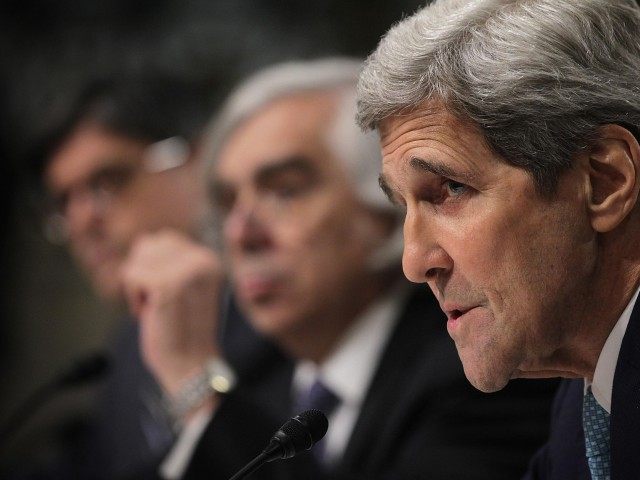Secretary of State John Kerry, Secretary of Energy Ernest Moniz, and Secretary of the Treasury Jack Lew are making the rounds on Capitol Hill in an effort to sell the Iran deal. Their appearance at the Senate Foreign Relations Committee on Thursday did not go well, as the three men struggled to answer basic questions and objections to the substance of the deal, as well as the process through which it had been rushed to the UN Security Council before coming to Congress. There were several new revelations at the hearing. Here are the 5 most important.
1. The International Atomic Energy Agency (IAEA) will likely rely on Iran to test its own military sites. According to one of the two secret “side deals” between Iran and the IAEA, tests at military sites will be conducted by Iran itself. Kerry said that he could not confirm that, as it was classified, but he said that the IAEA was satisfied that it could obtain the information it needed. Robert Menendez (D-NJ) suggested that was like setting a fox to guard the henhouse. A better analogy might be: it is like asking O.J. Simpson to find the killer.
2. The Iran deal does not retain ballistic missile sanctions for eight years–it relieves them immediately. Menendez pointed out to Kerry that this week’s UN Security Council Resolution 2231 merely provides that Iran is “called upon” to refrain from “any activity related to ballistic missiles designed to be capable of delivering nuclear weapons” for eight years, while Resolution 1929, which it replaced, said that Iran “shall not” do such activity. Kerry had no answer, but claimed the U.S. fought hard for the (meaningless) eight-year extension.
3. The Obama administration contrived the deal’s 90-day delay as a propaganda trick. Kerry claimed that the Iran deal, as codified by the UN Security Council, would only be implemented after a 90-day delay so that Congress would be able to complete its 60-day review under the Iran Nuclear Agreement Review Act (the “Corker bill”). However, Resolution 2231 is not contingent on Congress’s approval and the administration will not ask for a Security Council re-vote if Congress rejects the deal–nor could it, because others wield a veto.
4. The administration does not plan to re-authorize existing U.S. sanctions on Iran when they expire in 2016. This was a sticking point for Menendez, who noted that the Iran deal prevents the U.S. from re-applying existing nuclear sanctions once Iran complied with the deal. Surely, then, we would want to extend the existing sanctions until Iran complied? If the snap-back provisions of the Iran deal are to be effective, surely they must snap back to…something? The administration is evidently prepared to concede yet more ground to Iran.
5. John Kerry does not think Israel’s government (or opposition) knows what it is talking about. Kerry cited–and the State Department’s Marie Harf tweeted–a blog post about a former Israeli intelligence official who likes the Iran deal, adding that Israelis “who know what they are talking about” support it. Kerry was questioned about his source, as well as the claim itself. Did he not think Israeli Prime Minister Benjamin Netanyahu knows what he is talking about? Kerry deflected, saying only that Netanyahu knows his own fears.

COMMENTS
Please let us know if you're having issues with commenting.